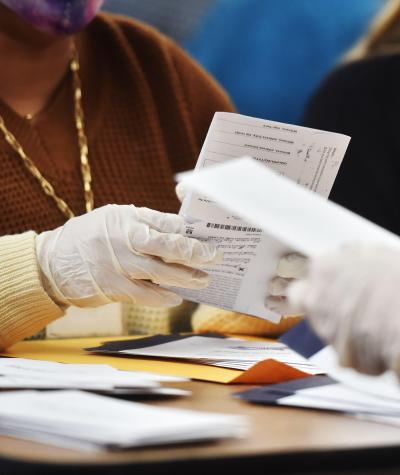Who Is Paying for Trump’s Lawsuits and Recounts?
The 2020 election cost a record-breaking $14 billion—but legal costs are continuing to pile up in the wake of Election Day, with the Trump campaign filing longshot lawsuits across the country and recounts planned in multiple states.
Who is footing the bill?
For the most part, these legal and recount expenses will be covered by the Republican National Committee (RNC) and the Trump campaign. The money will likely be drawn from three separate sources.
First, the RNC (as well as its Democratic counterpart, the Democratic National Committee (DNC)), has a segregated account for legal and recount expenses. The RNC’s and DNC’s legal accounts can accept individual donations of up to $106,500 each.
Over the past few years, the RNC and the DNC have raised countless millions for their legal accounts, in part through wealthy donors writing six- or seven-figure checks to joint fundraising committees like Trump Victory, with a portion of those checks deposited into the party’s legal account.
Second, FEC regulations allow candidates to set up a separate recount account, or a separate authorized committee, subject to the same limits that apply to their campaign ($2,800 from an individual, $5,000 from a PAC). Individual donors who maxed-out to the Trump or Biden campaign during the election may give an additional $2,800 to the Trump or Biden recount account.
Third, candidates may use any campaign money left over from the 2020 election to cover post-election legal and recount expenses. The Trump campaign, however, appears to be out of money and ended the 2020 campaign in debt.
Trump and Biden Raising Money, Citing Post-Election Litigation
Trump has been fundraising furiously since the election, with emails and texts almost hourly soliciting contributions to Trump’s “official election defense fund” or the “election defense task force.” But in the week following the election, the fine print on the fundraising appeals showed that 60% of all donations would go toward paying down Trump’s 2020 campaign debt.
Only those donors who maxed-out to Trump’s 2020 campaign would see any of their money go to Trump’s recount account.
Contributions towards Trump’s campaign debt count towards the 2020 general election contribution limits; a donor who already gave the $2,800 legal maximum to Trump’s 2020 campaign could not give more towards debt retirement.
For those donors who maxed-out to Trump’s 2020 campaign, 60% of each check to the “official election defense fund” instead went toward Trump’s recount account, up to $2,800.
On Nov. 10, the small print changed: now 60% of every donation goes to Trump’s new leadership PAC, “Save America.” Only after a donor gives the $5,000 legal maximum to Save America would any portion of their contribution go to Trump’s recount account.
The remainder of every check, 40% goes to the RNC, up to the legal maximum of $35,500. Only donors who’ve maxed out to the RNC will have their contributions deposited in the party’s legal and headquarters accounts, each of which can accept contributions of up to $106,500.
Biden, for his part, has created a new joint fundraising committee, “Biden Fight Fund.” Fundraising solicitations show that donations first go to the DNC’s general account and legal fund, up to $142,000, with the next $2,800 going to Biden’s recount fund. The Biden campaign does not appear to have any debt from the 2020 election.
How much money could they need for election litigation?
The costs of post-election litigation can be difficult to assess; the expenses will primarily consist of attorney’s fees, plus some legal filing fees and travel costs. Those disbursements should be disclosed on the RNC’s and Trump campaign’s post-general election reports, due on Dec. 3, 2020.
Costs associated with recounts vary state-by-state.
In Wisconsin, the campaign that requests a recount pays for it. The recount of Wisconsin’s 2016 presidential vote cost approximately $3.5 million and changed the final tally by just 131 votes. Trump has declared an intention to request a recount in Wisconsin and will be on the hook for the recount fees.
In Georgia, when the vote margin is less than 0.5%--which appears to be the case for the 2020 presidential race—the state will cover the recount costs.
But that hasn’t stopped the Trump campaign from raising money for an “Official Georgia Recount Fund,” with 60% of every check going towards 2020 debt retirement.
